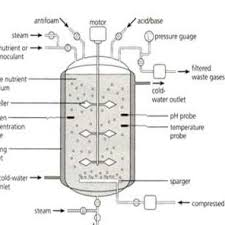Question Bank
Unit 07
Q-1What is biotechnology?
“Biotechnology means any technological application that uses biological systems or living organisms to make or modify products or processes for specific use. It refers to the use of microorganisms such as bacteria, yeasts, or biological substances such as enzymes, to perform specific industrial or manufacturing processes.”
Q-2Explain recombinant insulin.
Insulin is required by diabetic patients to remove excess sugar from the blood. Diabetic patients have a very low level of insulin or no insulin produced by the body. Therefore, they need external insulin to control blood glucose levels.
Later it was discovered that the insulin produced by the pancreas of the pigs can be used by humans. But there were not enough pigs to provide the quantities of insulin required. This led to the cloning of the human insulin gene.
The specific gene sequence that codes for human insulin were introduced in E.coli bacteria. The gene sequence altered the genetic composition of the E.coli cells. Within 24 hours several E.coli bacteria containing the recombinant human insulin gene were produced. The recombinant human insulin was isolated from E.coli cells.
Q-3What is Gene therapy?
Gene Therapy holds the most promising answer to the problem of genetic diseases. Gene therapy is used to treat genetic disorder usually by the insertion of a normal gene or correct gene for the defective or inactive gene into an individual with the help of vectors such as retrovirus, adenovirus, and herpes simplex virus.
The normal gene replaces the defective or inactive gene and carries out its functions. The therapy has the highest chances of developing a permanent cure if introduced in the earliest stages of life.
Q-4Enlist the benefits of bio technology in agriculture.
Increased crop productivity
Enhanced crop protection
Improvements in food processing
Improved nutritional value
Better flavour
Fresher Produce
Q-5Explain the preparation of ethanol.

Q-6Explain the preparation of acetic acid.

Q-7What are enzymes?
Enzymes help speed up chemical reactions in the human body. They bind to molecules and alter them in specific ways. They are essential for respiration, digesting food, muscle and nerve function, among thousands of other roles. Enzymes are built of proteins folded into complicated shapes; they are present throughout the body. The chemical reactions that keep us alive – our metabolism – rely on the work that enzymes carry out. Enzymes speed up chemical reactions; in some cases, enzymes can make a chemical reaction millions of times faster than it would have been without it. A substrate binds to the active site of an enzyme and is converted into products. Once the products leave the active site, the enzyme is ready to attach to a new substrate and repeat the process.
Q-8What are biofuels?
Biofuels are combustible fuels created from biomass; in other words, fuels created from recently living plant matter as opposed to ancient plant matter in hydrocarbons. The term biofuel is usually used to reference liquid fuels, such as ethanol and biodiesel that are used as replacements for transportation fuels like petroleum, diesel and jet fuel. Biofuels can also include solid fuels like wood pellets and biogas or syngas.
There are two main types of biofuels – ethanol and biodiesel. The simplest way to distinguish between the two is to remember ethanol is an alcohol and biodiesel is an oil. Ethanol is an alcohol formed by fermentation and can be used as a replacement for, or additive to, gasoline whereas biodiesel is produced by extracting naturally occurring oils from plants and seeds in a process called transesterification. Biodiesel can be combusted in diesel engines.
Q-9What are bio-fertilizers?
A bio fertilizer is a substance which contains living micro-organisms i.e.; when applied to seeds, plant surfaces, soil, colonize the rhizosphere or the interior of the plant and promotes growth by increasing the supply or availability of primary nutrients to the host plant. Bio fertilizers add nutrients through the natural processes of nitrogen fixation, solubilising phosphorus, and stimulating plant growth through the synthesis of growth-promoting substances. The microorganisms in bio fertilizers restore the soil natural nutrient cycle and build soil organic matter. Through the use of bio fertilizers, healthy plants can be grown, while enhancing the sustainability and the health of the soil. Bio fertilizers can be expected to reduce the use of synthetic fertilizers and pesticides, but they are not yet able to replace their use. Since they play several roles, a preferred scientific term for such beneficial bacteria is plant growth promoting rhizo-bacteria.
Q-10What are bio surfactant?
Bio surfactants can be defined as the surface-active bio molecules produced by microorganisms with wide-range of applications. In recent years, due to their unique properties like specificity, low toxicity and relative ease of preparation, these surface-active bio molecules have attracted wide interest. Due to their unique functional properties, bio surfactants were used in several industries including organic chemicals, petroleum, petrochemicals, mining, metallurgy (mainly bioleaching), agrochemicals, fertilizers, foods, beverages, cosmetics, pharmaceuticals and many others. They can be used as emulsifiers as well as demulsifiers, wetting agents, foaming agents, spreading agents, functional food ingredients and detergents. The interfacial surface tension reducing ability of bio surfactants made them to play important role in oil recovery and bioremediation of heavy crude oil.
Q-11What are bio reactors?
A bioreactor helps to produce a large volume of culture. The bioreactor is a large vessel where the different cells such as human or plant, or animal cell are used to culture new biological products. It provides optimum conditions like temperature, pH, substrate, oxygen, etc required for the culturing of desired products. Simple stirred-tank bioreactor and sparged stirred-tank bioreactor are the two types bioreactors used for this purpose.
